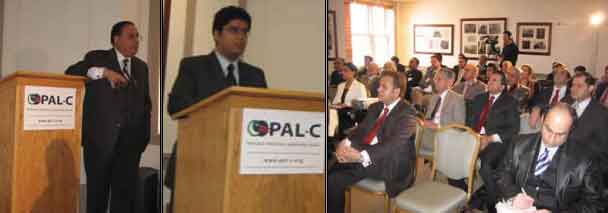Higher Education Reforms
in Pakistan Discussed in Washington
 Left
to Right: Dr Atta ur Rehman, Ali Chaudhry, and a section
of the audience
Left
to Right: Dr Atta ur Rehman, Ali Chaudhry, and a section
of the audience |
Washington,
DC: The Pakistani American Leadership Center (PAL-C) organized
an engaging discussion on "Higher Education Reforms in
Pakistan" on February 12, 2007 at the Robert and Bernice
Alumni House in Georgetown University. The keynote speaker
for the event was Dr. Atta ur Rehman, Chairman of the Higher
Education Commission of Pakistan.
Mr. Ali Chaudhry, Executive Director of PAL-C, welcomed the
Chairman and thanked him for his participation and desire
to engage students and academics on this important issue.
Mr. Chaudhry briefed the audience on PAL-C's mission, activities
and its efforts to promote education and dialogue within the
Pakistani-American community.
Dr Att aur Rehman told students at Georgetown University that
efforts are afoot to develop strong linkages between Pakistani
and American institutions of science and technology to spur
Pakistan towards a knowledge-based economy. He highlighted
some of the reforms introduced to revamp the higher education
system in Pakistan on modern lines. Pakistan would be sending
a large number of students to the United States in the coming
years for higher education, he said, while hinting at the
possibility of the two countries coming up with a 10-year
program for the training of Pakistani students in various
disciplines.
Pakistan desires to send about 3000 students to the United
States in the coming years for training at Masters, PhD, post-doctoral
and technical levels in wide-ranging fields including basic,
applied and social sciences. Pakistan, he said, has established
50 linkages with British universities and is running the world’s
largest Fulbright program. As many as 640 Pakistani students
would be sent to American Ivy League universities in the next
five years, mostly for applied and basic sciences. He spoke
about the establishment of high-tech universities in Pakistan
with Pakistani resources in collaboration with Germany, France,
Sweden, South Korea, Japan, Austria, Italy and China. Once
operational, these universities would have some 50,000 students
on their rolls and produce 10,000 highly qualified engineers
every year.
He said that "these will be closely connected with the
needs of industry of today and tomorrow and promote the development
of a knowledge economy. As a result of this program we hope
to provide a large number of suitably qualified engineers
in sectors including telecom, steel, metallurgy, ship building,
information technology, computer, software, sports, surgical
and automobile industries as well as in the agriculture sector
for improving crop yields.”
Addressing another meeting later in the afternoon at the American
Association for the Advancement of Science, Dr Attaur Rehman,
who is also chairman of the Higher Education Commission, said
education was the best tool for building a moderate society.
Terrorism, he stressed, stems from hopelessness and alienation,
from ignorance and illiteracy and from lack of opportunity,
conditions and states of mind which can be set right through
education. He pointed out that the United States is spending
$2 billion a week on the wars presently being fought, while
just 10 percent of the amount that has been spent so far could
have ensured 100 percent literacy in Iraq and Afghanistan.
Dr Rehman told the meeting that the total GDP of OIC member
countries is $1,400 billion, which is 50 percent of the GDP
of Germany alone. Twenty-two of the Arab states surveyed spend
7.1 percent of their GDP on defense and only 0.2 percent on
research and development. Their spending on health is just
1.25 percent. He argued that by opening up unprecedented opportunities
for higher scientific and technical education, Pakistan has
put a “top-down” approach in motion. Those who
argue that what Pakistan needs is not higher education but
basic education, should study Sri Lanka, 95 percent of whose
population is literate, but which remains lacking in vital
areas of development. The former Soviet Union was a great
military power but it was unable to produce a good car or
a nice TV set. He said 2,000 of US companies with sales of
$232 billion were run by MIT-trained men and women. He provided
the meeting with a detailed briefing on the steps Pakistan
has taken to make up for time lost because of the pursuit
of education policies that did not emphasis the right things
and failed to propel the country in the right direction.
Dr Atta, who was in the US capital to co-chair the inaugural
meeting of Pakistan-US Science and Technology Committee last
Tuesday, suggested that Pakistan and the United States could
jointly sponsor a program, spanning over the next ten years
to train the Pakistani students.
The presentation was followed by an interactive “Question
and Answer” session.
-------------------------------------------------------------------------------------

